
The Inauguration of the President of Ukraine is a ceremony that takes place to mark the start of a new term for a newly elected president.

The Inauguration of the President of Ukraine is a ceremony that takes place to mark the start of a new term for a newly elected president.

The presidential inauguration traditionally starts at the building of the Verkhovna Rada building in the center of the Pecherskyi District in Kyiv. Prior to the arrival of the president-elect, the chairman of the Verkhovna Rada introduces distinguished dignitaries including foreign guests and former presidents. Upon arrival, the president goes into the main chamber to the tune of the presidential fanfare, before beginning the ceremonies with a rendition of Shche ne vmerla Ukraina by a choir and band. Once this is done, the president-elect will put their hand on the Constitution of Ukraine and the Peresopnytsia Gospels simultaneously while reciting the oath of office administered by the chairman of the Constitutional Court of Ukraine: [1]
According to article 104 of the constitution, the Ukrainian text for the oath is as follows:
Я, (ім'я та прізвище), волею народу обраний Президентом України, заступаючи на цей високий пост, урочисто присягаю на вірність Україні. Зобов'язуюсь усіма своїми справами боронити суверенітет і незалежність України, дбати про благо Вітчизни і добробут Українського народу, обстоювати права і свободи громадян, додержуватися Конституції України і законів України, виконувати свої обов'язки в інтересах усіх співвітчизників, підносити авторитет України у світі.
Official English translation:
I, (name and surname), elected by the will of the people as the President of Ukraine, assuming this high office, do solemnly swear allegiance to Ukraine. I pledge with all my undertakings to protect the sovereignty and independence of Ukraine, to provide for the good of the Motherland and the welfare of the Ukrainian people, to protect the rights and freedoms of citizens, to abide by the Constitution of Ukraine and the laws of Ukraine, to exercise my duties in the interests of all compatriots, and to enhance the prestige of Ukraine in the world. [2]
The new president then signs the text transfers it over to the chairman of the Constitutional Court after conducting the oath. [1] The performance of the Molytva za Ukrainu (Prayer for Ukraine) will then follow. The president will then receive state symbols and heraldry, including the seal, the collar and bulava of the president of Ukraine. Once this is done, the president will deliver a speech that will be given in the Ukrainian language, although on some occasions Russian has been used throughout the speech. After the speech, the swearing-in-ceremony is declared closed and the president walks to the nearby Mariinskyi Palace to take the salute as supreme commander-in-chief of the Armed Forces of Ukraine. This formal military ceremony has also been known to take place at the Office of the President on Bankova and in 2014, on Sofia Square. During the ceremony the president receives the salute of the commander, Kyiv Presidential Honor Guard Battalion who reports the following:
The president then inspects the guard before greeting them:


The president then goes on to receive the report from the chiefs of the senior administrative institutions and the uniformed services of the military, including the minister of defence and the head of the security service, as of the most recent inauguration in 2019, the commanders state their name and rank (only if in uniform) and declares their institution's readiness to carry out their task. After this the battalion performs a marchpast to the tune of a march by its attached military band before heading inside.
The entire ceremony is covered on Ukrainian TV channels such as NTN, 5 Kanal, 1+1 and ICTV.
| Date | Hetman | Location Place | Confirmed by | Document Sworn On | Notes |
|---|---|---|---|---|---|
| April 29, 1918 | Pavlo Skoropadsky | Saint Sophia's Cathedral Kyiv | Nicodemus (temporarily governing Eparchy of Kyiv) | Unknown |


The Socialist Party of Ukraine was a social democratic and democratic socialist political party in Ukraine. It was one of the oldest parties in Ukraine and was created by former members of the Soviet-era Communist Party of Ukraine in late 1991, when the Communist Party was banned. The party was represented in the Verkhovna Rada, Ukraine's parliament, from 1994 to 2007 and was the third and fourth largest party during that period. From 2007 onwards the party's electoral results became increasingly marginal, failing to win any seats in subsequent elections despite historically strong support in the central regions of the country. Oleksandr Moroz had led the party for more than twenty years before his resignation in 2012.

The Verkhovna Rada of Ukraine, often simply Verkhovna Rada or just Rada, is the unicameral parliament of Ukraine. The Verkhovna Rada is composed of 450 deputies, who are presided over by a speaker. The Verkhovna Rada meets in the Verkhovna Rada building in Ukraine's capital Kyiv. The deputies elected on 21 July 2019 Ukrainian parliamentary election were inaugurated on 29 August 2019.

Oleksandr Oleksandrovych Omelchenko was a Ukrainian politician who served as mayor of Kyiv, the capital of Ukraine, first elected in 1999. Running for a third term he lost his re-election bid in March 2006. Omelchenko was also a People's Deputy of Ukraine from 2007 to 2012.
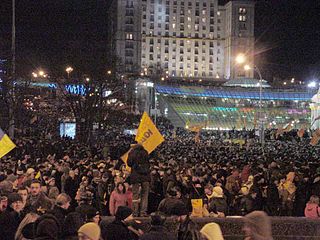
Below is the timeline of events that followed the runoff presidential election held in Ukraine on 21 November 2004 that sparked off the "Orange Revolution".
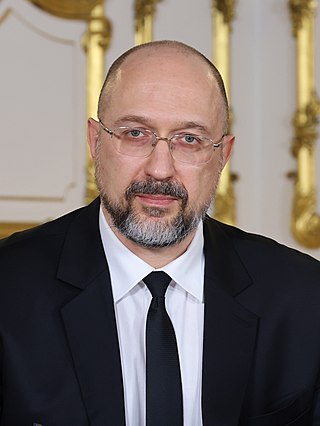
The Prime Minister of Ukraine is the head of government of Ukraine. The prime minister presides over the Cabinet of Ministers of Ukraine, which is the highest body of the executive branch of the Ukrainian government. The position replaced the Soviet post of chairman of the Council of Ministers of the Ukrainian SSR, which was established on March 25, 1946.
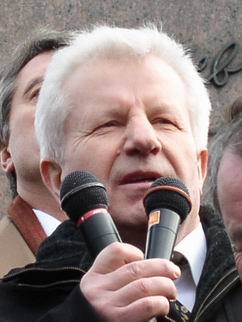
Oleksandr Oleksandrovych Moroz is a Ukrainian politician. He was the Chairman of the Verkhovna Rada twice, from 1994 to 1998 and again from 2006 to 2007. Moroz is one of the founders and the leader of the Socialist Party of Ukraine, formerly an influential political party in Ukraine. Moroz lost parliamentary representation when the Socialist Party failed to secure sufficient number of votes (2.86%) in the 2007 snap parliamentary election, falling 0.14% short of the 3% election threshold.
The Cabinet of Ministers of Ukraine, commonly referred to as the Government of Ukraine, is the highest body of state executive power in Ukraine. As the Council of Ministers of the Ukrainian SSR, it was formed on 18 April 1991, by the Law of Ukrainian SSR No.980-XII. Vitold Fokin was approved as the first Prime Minister of Ukraine.

The Constitutional Court of Ukraine is the sole body of constitutional jurisdiction in Ukraine. The Constitutional Court of Ukraine interprets the Constitution of Ukraine in terms of laws and other legal acts.
The political crisis in Ukraine lasted from April to June 2007 was part of political stand off between coalition and opposition factions of Verkhovna Rada that led to the unscheduled 2007 Ukrainian parliamentary election. It started on 2 April 2007 as a culmination of long lasting crisis and degradation of the parliamentary coalition when the President of Ukraine attempted to dissolve the parliament.

The National Security and Defense Council of Ukraine is the coordinating state body of the executive power under the President of Ukraine on issues of national security and defense.

The President of Ukraine is the head of state of Ukraine. The president represents the nation in international relations, administers the foreign political activity of the state, conducts negotiations and concludes international treaties. The president is directly elected by the citizens of Ukraine for a five-year term of office, limited to two terms consecutively.

A People's Deputy of Ukraine is a member of parliament and legislator elected by a popular vote to the Verkhovna Rada. People's Deputies of Ukraine are often referred to simply as the "deputies"; however, regular deputies are members of regional and local councils, while people's deputies are elected to the national parliament, Verkhovna Rada. Prior to 1991, the Verkhovna Rada was named the Supreme Council of People's Deputies of the Ukrainian Soviet Socialist Republic.

The Russian presidential inauguration is a ceremony to mark the start of a term of a president of Russia. The president's term is six years. In the case of extraordinary election, the inauguration is conducted thirty days after the announcement of the official election results by the Central Election Commission of Russia. Since Vladimir Putin's first inauguration in 2000, the ceremony took place in the Grand Kremlin Palace of the Moscow Kremlin. The inauguration ceremony of the Russian president has traditionally been accompanied by the festive prayer service of the Patriarch of Moscow and all Rus', which dates back to 1498, when the first wedding took place for the reign of Prince Dmitry Ivanovich, the grandson of Ivan III.

Hennadiy Hennadiyovych Moskal is a Ukrainian politician and the former governor of Zakarpattia Oblast, serving from 2015 to 2019. He was previously appointed governor of the Luhansk Oblast while the war in Donbas was ongoing in Luhansk Oblast.

Iryna Volodymyrivna Herashchenko is a Ukrainian journalist and politician currently serving as a People's Deputy of Ukraine from European Solidarity. She is a Merited Journalist of Ukraine since 2000. Former First Deputy Chairwoman of the Verkhovna Rada, also serving as President's Humanitarian Envoy at the Minsk peace talks regarding the war in Donbas.

Serhiy Vladyslavovych Sobolev is a Ukrainian politician. He is a member of the Verkhovna Rada (parliament) and acting Batkivshchyna faction leader.

The Verkhovna Rada of Ukraine of the 8th convocation was a convocation of the legislative branch of the Verkhovna Rada, Ukraine's unicameral parliament. The 8th convocation met at the Verkhovna Rada building in Kyiv, having begun its term on 27 November 2014 following the last session of the 7th Verkhovna Rada. Its five-year term came to an end on July 24, 2019, marking the end of its tenth session.
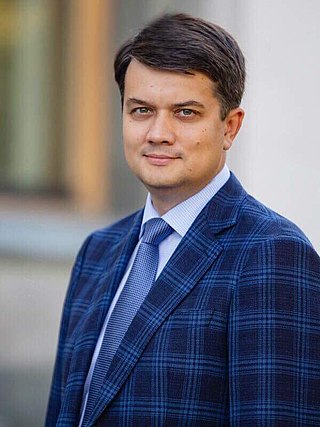
Dmytro Oleksandrovych Razumkov is a Ukrainian politician and former Chairman of the Verkhovna Rada. Previously he was leader of the Servant of the People party. In the 2019 Ukrainian parliamentary election he led the party to a win of 124 seats on the nationwide party list and 130 constituency seats.
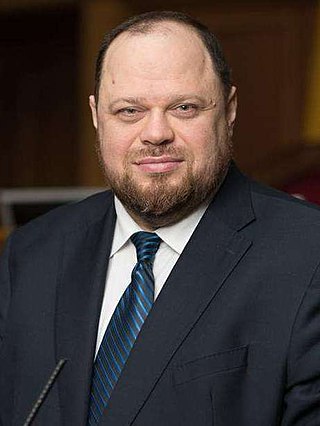
Ruslan Oleksiyovych Stefanchuk is a Ukrainian politician, lawyer and Chairman of the Verkhovna Rada.